
These maps are beautifully crafted too. BioWare has many strengths, but 3D level design has, up to this point, not been one of them. The studio tends towards disorienting corridor mazes which feel jarringly artificial and are a nightmare to navigate. As of Inquisition, this is no longer the case. Your character constantly adjusts his centre of balance as he scales grassy hillsides and skids down stony scree slopes, pausing at the summit to sample the glorious views of the surrounding landscape. Walls and barriers are few and far between, but BioWare doesn't dispense with its love of mazes entirely. The route toward an objective is not always obvious, sometimes involving taking a roundabout path. But these feel like natural challenges of the environment rather than arbitrary level design obstacles.
Pretty environments to coo at are all well and good, but it's what they contain that really matters. Here I'm a little less convinced by BioWare's approach. There's loads of stuff to do in these areas - the Hinterlands alone must have 30+ hours worth of content (that word again). But it's an eclectic mixture of full-fat sidequests, MMO style fetch quests, endless collectibles and cookie-cutter activities such as establishing camps that act as fast-travel nodes, and fade-rifts that offer big dollops of experience points when closed.
Everything is loosely tied together by the "power" mechanic, as well as rewarding XP and loot. The camps and fade rifts are enjoyable for a while, but I found the collectible "requisition" orders and the "Please find this incredibly rare item/creature that's actually just over that hill" nonsense irritating. I'd definitely prefer fewer, more involved side quests. These exist, with a couple of particularly brilliant examples in the Crestwood and Western Approach provinces, but sometimes it's hard to figure out what is worth pursuing and what is acting as filler because there's so many different objectives crammed into your journal. I should caveat that you don't need to do all of this, and also I basically had the game hooked into my veins for a week trying to experience as much as possible, so if you've got more time and patience than I, you might enjoy these aspects more.
Inquisition has several more obvious problems. Combat is furious and colourful. Watching your party unleash abilities and powers is like an seeing an impressionist painter throw a hissy fit, taking his rage out on his canvas. Tactically though, battles are very limited. The camera doesn't elevate sufficiently to give you a good view of the battlefield, orders are very simplistic move/attack variants, and the AI seems to enjoy getting up close and personal, regardless of ability class or enemy size. BioWare has also altered how healing works. Now, instead of crafting healing potions or using spells, you have a default supply of eight health potions which you can restock at camps or supply caches (with others that can be crafted if you want). This works well enough for general scraps, but the lack of a default healing spell can be a real problem when fighting bosses. Because of this, boss fights often devolve into running around desperately reviving fallen comrades so they can get a few hits in before being knocked out again. Oh, and most bosses will regenerate huge shields or armour bars several times during a fight, which is an absolutely horrible idea that turns most encounters into an exhausting chore.
Despite these issues, both the combat and the environments mark a significant improvement over the previous Dragon Age. Meanwhile, BioWare's storytelling and characterisation chops remain as strong as ever. Varric, the loveable rogue dwarf from Dragon Age II, makes a very welcome return to your party. But he's the only familiar face to accompany you on missions. Everyone else is new, and for the most part, excellent company. You'll probably agonise over choosing your party out in the field. Will it be Dorian, the wisecracking, moustachioed mage who exudes charisma from the moment he swaggers into your story, or Sera, the kooky elvish rogue who is always elusive in her responses and has an obsession with bees and bums?
For my money the best character is Cole, I don't want to detail him too much, but he's a tragic, creepy and above all mysterious figure, an unknown and possibly extremely volatile element thrown into your party. There are a couple of duds. Solas, the elvish mage has all the personality of a milk sandwich. Furthermore, many of the quest givers and other smaller characters are damaged by monotone voice acting, and the animations on all characters are pretty ropey. These lapses in detailing exemplify how Inquisition sometimes struggles with its own size.
As I said before, although Inquisition never forgets the importance of individual stories and personal relationships, it is more a tale about organisations and the politicking that goes on between them. This is where Inquisition really stands out, who you choose to ally the Inquisition with and, perhaps more importantly, who is left by the wayside, or even on the chopping block. A midgame mission sees you attending the ball of the Orlesian Empress, who is subject to at least three plots to usurp her throne, which provided you play the Great Game (of Thrones) right, you can manipulate in several ways. In addition, as the title of your organisation suggests, many missions include an optional epilogue where you sit in judgment of individuals involved in crimes against the realm. These inquisatorial vignettes are a great way of tying up loose ends from certain missions, and demonstrate BioWare's writing talent in their variety, nuance and darkly edged humour.
I like Inquisition a lot. There are rough edges, and it does sometimes creak under the weight of its own bulk. But it never collapses. I also can't deny that it's a joy to watch BioWare work on this scale. They make full use of this fantasy world they've spent goodness knows how long constructing, while letting you write your name all over it to a remarkable degree. Somewhere between Inquisition and Dragon Age II lies the perfect fantasy RPG, and while Inquisition pushes a little too far past that mark, it's undoubtedly the closest anyone has been in a while.
Pretty environments to coo at are all well and good, but it's what they contain that really matters. Here I'm a little less convinced by BioWare's approach. There's loads of stuff to do in these areas - the Hinterlands alone must have 30+ hours worth of content (that word again). But it's an eclectic mixture of full-fat sidequests, MMO style fetch quests, endless collectibles and cookie-cutter activities such as establishing camps that act as fast-travel nodes, and fade-rifts that offer big dollops of experience points when closed.
Everything is loosely tied together by the "power" mechanic, as well as rewarding XP and loot. The camps and fade rifts are enjoyable for a while, but I found the collectible "requisition" orders and the "Please find this incredibly rare item/creature that's actually just over that hill" nonsense irritating. I'd definitely prefer fewer, more involved side quests. These exist, with a couple of particularly brilliant examples in the Crestwood and Western Approach provinces, but sometimes it's hard to figure out what is worth pursuing and what is acting as filler because there's so many different objectives crammed into your journal. I should caveat that you don't need to do all of this, and also I basically had the game hooked into my veins for a week trying to experience as much as possible, so if you've got more time and patience than I, you might enjoy these aspects more.
Inquisition has several more obvious problems. Combat is furious and colourful. Watching your party unleash abilities and powers is like an seeing an impressionist painter throw a hissy fit, taking his rage out on his canvas. Tactically though, battles are very limited. The camera doesn't elevate sufficiently to give you a good view of the battlefield, orders are very simplistic move/attack variants, and the AI seems to enjoy getting up close and personal, regardless of ability class or enemy size. BioWare has also altered how healing works. Now, instead of crafting healing potions or using spells, you have a default supply of eight health potions which you can restock at camps or supply caches (with others that can be crafted if you want). This works well enough for general scraps, but the lack of a default healing spell can be a real problem when fighting bosses. Because of this, boss fights often devolve into running around desperately reviving fallen comrades so they can get a few hits in before being knocked out again. Oh, and most bosses will regenerate huge shields or armour bars several times during a fight, which is an absolutely horrible idea that turns most encounters into an exhausting chore.
Despite these issues, both the combat and the environments mark a significant improvement over the previous Dragon Age. Meanwhile, BioWare's storytelling and characterisation chops remain as strong as ever. Varric, the loveable rogue dwarf from Dragon Age II, makes a very welcome return to your party. But he's the only familiar face to accompany you on missions. Everyone else is new, and for the most part, excellent company. You'll probably agonise over choosing your party out in the field. Will it be Dorian, the wisecracking, moustachioed mage who exudes charisma from the moment he swaggers into your story, or Sera, the kooky elvish rogue who is always elusive in her responses and has an obsession with bees and bums?
For my money the best character is Cole, I don't want to detail him too much, but he's a tragic, creepy and above all mysterious figure, an unknown and possibly extremely volatile element thrown into your party. There are a couple of duds. Solas, the elvish mage has all the personality of a milk sandwich. Furthermore, many of the quest givers and other smaller characters are damaged by monotone voice acting, and the animations on all characters are pretty ropey. These lapses in detailing exemplify how Inquisition sometimes struggles with its own size.
As I said before, although Inquisition never forgets the importance of individual stories and personal relationships, it is more a tale about organisations and the politicking that goes on between them. This is where Inquisition really stands out, who you choose to ally the Inquisition with and, perhaps more importantly, who is left by the wayside, or even on the chopping block. A midgame mission sees you attending the ball of the Orlesian Empress, who is subject to at least three plots to usurp her throne, which provided you play the Great Game (of Thrones) right, you can manipulate in several ways. In addition, as the title of your organisation suggests, many missions include an optional epilogue where you sit in judgment of individuals involved in crimes against the realm. These inquisatorial vignettes are a great way of tying up loose ends from certain missions, and demonstrate BioWare's writing talent in their variety, nuance and darkly edged humour.
I like Inquisition a lot. There are rough edges, and it does sometimes creak under the weight of its own bulk. But it never collapses. I also can't deny that it's a joy to watch BioWare work on this scale. They make full use of this fantasy world they've spent goodness knows how long constructing, while letting you write your name all over it to a remarkable degree. Somewhere between Inquisition and Dragon Age II lies the perfect fantasy RPG, and while Inquisition pushes a little too far past that mark, it's undoubtedly the closest anyone has been in a while.
-
Overall84 / 100


MSI MPG Velox 100R Chassis Review
October 14 2021 | 15:04

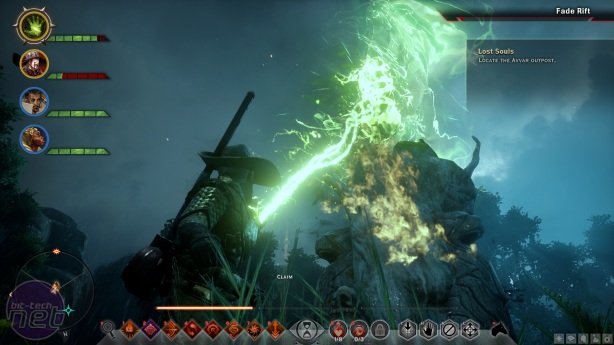
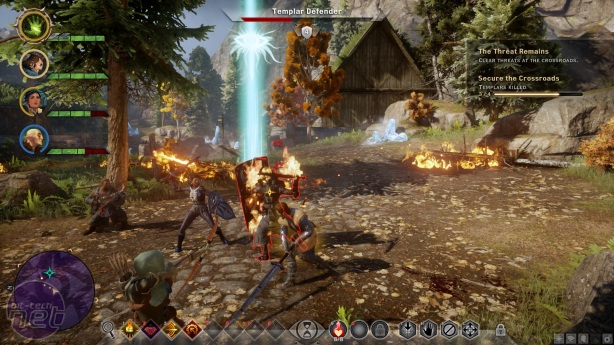
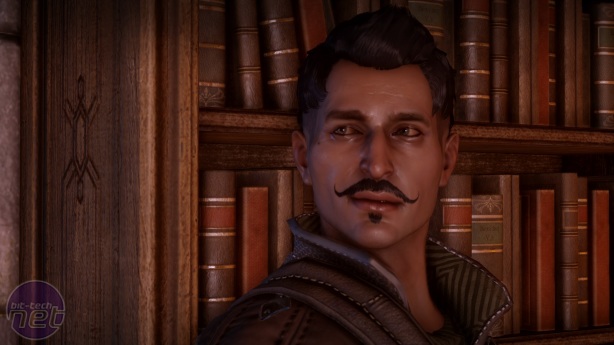
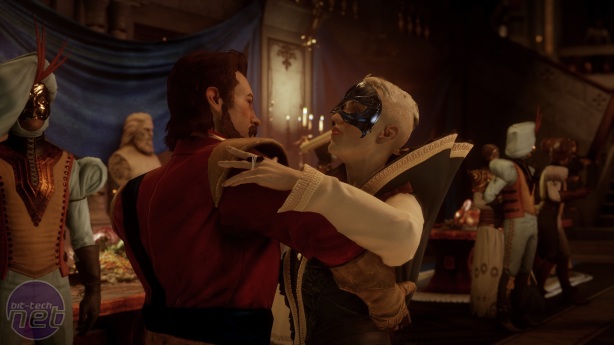
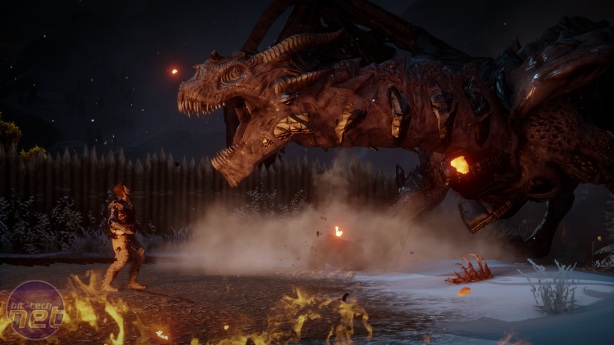








Want to comment? Please log in.